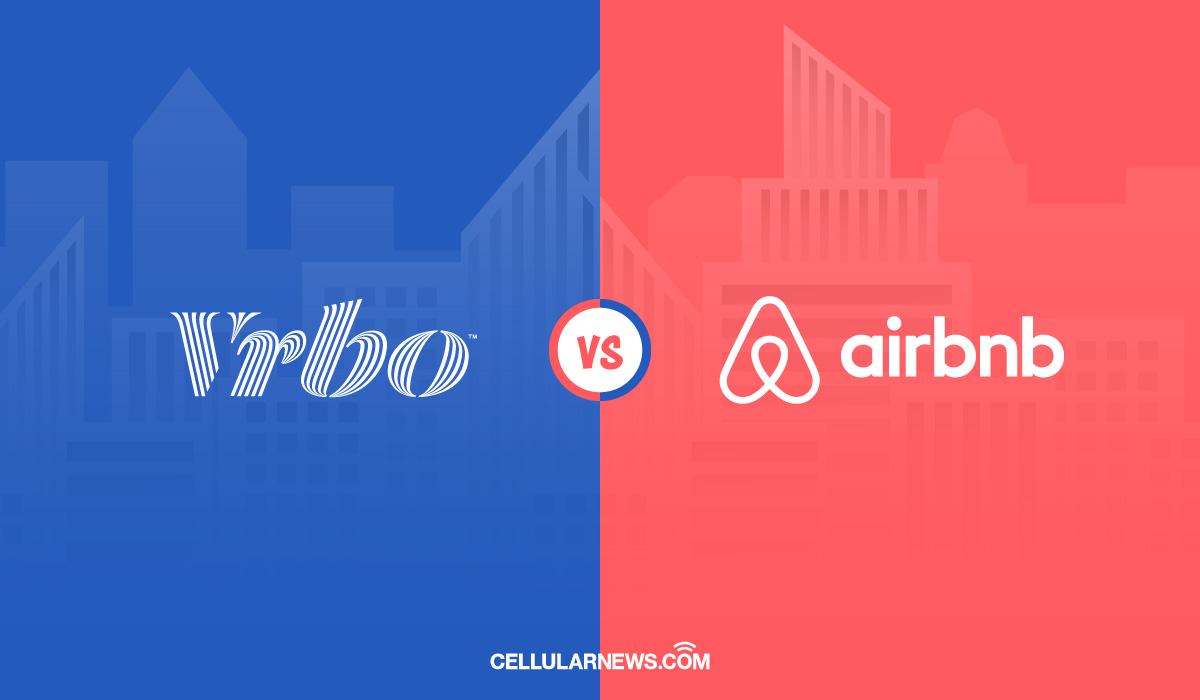Everyone loves traveling, whether it’s to some local countryside or halfway across the world. However, the downside of traveling is that the costs can stack up a lot. Flights and tickets already cost a fortune but so do accommodations. How can you make sure you’re booking the best, but most affordable, option? In this article, we’re comparing two famous affordable booking services: Vrbo vs Airbnb. Which is better for your needs? Let’s find out.
Vrbo vs Airbnb: Overview
So, you’ve read our TripAdvisor app review and have considered booking a hotel at your destination of choice. However, the hotels on the site are still too expensive, so you’ve decided on booking something more affordable. You’ve heard about affordable booking apps like Vrbo and Airbnb before, but you’re not exactly sure which one to choose. What’s the difference? Here’s a quick overview of their characteristics and how they compare:
| Features | Vrbo | Airbnb |
|---|---|---|
| Rental Types |
Traditional accommodations No shared spaces Usually entire properties |
Non-traditional accommodations
Shared spaces allowed |
| Host Network | 2 million listings, 190 countries | 7 million listings, 220 countries |
| Booking Fee (for guests) | 6-12% service fee | 14.2% service fee |
| Listing Fee | $499 annual subscription for all bookings, or;
5% commission per booking + 3% processing fee |
3% fee per completed booking;
Listing a rental is free; +20% service fee for experiences (optional) |
| Damage Deposits | Yes | Yes |
| Mode of Payment | Flexible | Upfront advanced payments |
| Cancellation | 5 types of cancellation policies | 3 types of cancellation policies |
What Is Vrbo?
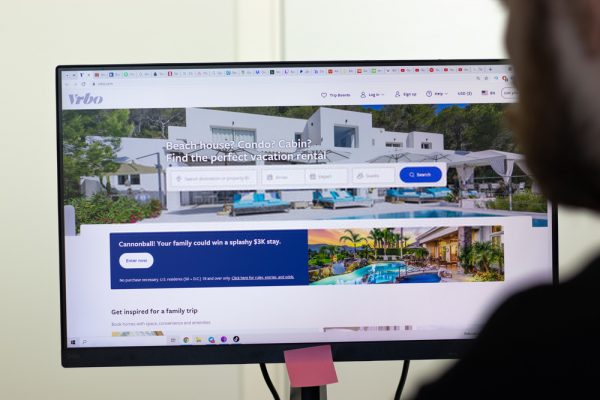
Pros
- Large accommodations for groups
- No shared spaces mean more privacy
- Flexible modes of payment
Cons
- Not great for individual travelers
- A smaller number of listings between Vrbo vs Airbnb
- Less flexible with cancellation
Before digging into the fight of Vrbo vs Airbnb, an introduction of each of the two apps might be in order—starting with Vrbo. Vrbo is a little less popular compared with Airbnb (at least, it has a lot fewer listings in comparison). However, Vrbo has been around longer than Airbnb. It stands for “Vacation Rental by Owner” and was created way back in 1995 meant for property advertisement.
At first, Vrbo was meant for renters who needed a place to stay long-term. However, HomeAway acquired the company in 2006, which then merged Vrbo’s host network with HomeAway’s. As a result, Vrbo grew its host network, including those from sites like VacationRentals.com. However, as opposed to Airbnb, Vrbo mainly specializes in houses, apartments, condos, and villas.
Moreover, unlike Airbnb, Vrbo only allows rental for entire homes without compromise for shared spaces. This makes it slightly more difficult for hosts with individual rooms. However, it’s extremely convenient for renters and tourists traveling in groups looking for vacation rentals. Of course, despite renting out larger accommodations, it’s still much cheaper than staying at a hotel. That’s why it’s a large competitor to apps like Airbnb.
What Is Airbnb?
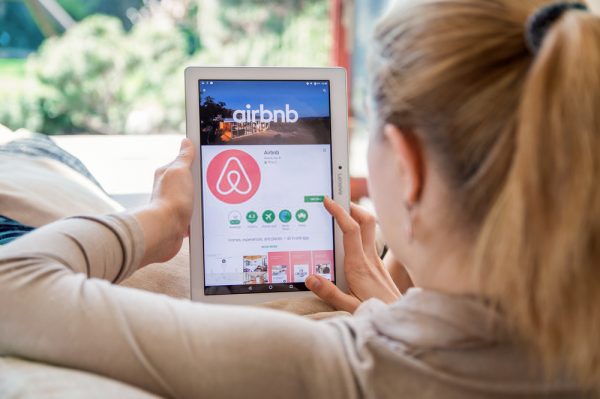
Pros
- – Shared spaces allowed
- – Great for lone travelers or pairs
- – Flexible cancellation policies
Cons
- – Upfront payment all the time
- – Varying property prices depending on the algorithm
- – Less family-friendly
By far, one of the best travel apps everyone recommends is Airbnb. It’s not surprising why. At this point, it doesn’t need much of an introduction as it’s one of the biggest rental services available. However, if you’re still somehow unfamiliar with it, Airbnb is simply an app wherein you can book affordable accommodations ranging from vacation home rentals, shared rooms and spaces, and even full-blown apartments.
Despite being created later in 2008, Airbnb quickly propelled itself as one of the most essential mobile apps for travelers. It was originally called “Air Bed and Breakfast” but rebranded to Airbnb in 2009. Unlike Vrbo, it aimed to be the ideal platform for affordable short-term renters.
Fast-forward to 2021, the platform is famous for its unique experiences and shared spaces that are great for budget travelers. It’s also extremely famous for its flexible cancellation policies and its large network of hosts.
Vrbo vs Airbnb: What Are Their Differences?
At first glance, it might seem like there aren’t many differences between Vrbo vs Airbnb. However, while the two services are good choices for travelers on a budget, they do have their differences. These differences could influence your decision and ultimately sway you either way. What are they? Let’s examine the nitty-gritty behind each service and see which one is a better fit for you.
Rental Types

The first (and arguably the biggest) difference between Vrbo vs Airbnb is in their rental types. Most prominently, the main difference is that Vrbo keeps things traditional and likes to rent out entire estates. Hence, you’ll mostly find entire apartments, houses, tree houses, and even castles on Vrbo. The company strictly implements this rule and never allows shared spaces in its listings.
As a result, most customers who gravitate toward Vrbo usually travel in groups. After all, it would be a waste of a large space to simply travel alone or in pairs. On the other hand, this also means that Vrbo is great for folks who love their privacy. Unlike Airbnb, folks who choose Vrbo will never have to worry about sharing common areas with other guests and strangers. Of course, some say that’s part of Airbnb’s charm, but those who value privacy might think otherwise.
On the other hand, Airbnb is more flexible in the properties it allows in its listings. The site makes no such restriction against shared spaces so it has become famous for that type of accommodation. Moreover, this gives smaller hosts more opportunities to utilize their empty rooms and make money on the side.
As a result, Airbnb offers a much more unique experience compared with Vrbo. After all, you won’t get to experience shared spaces or common areas in most hotels or sites like Vrbo. However, it does have a downside in that there’s less privacy for folks who value their space. Hence, some might find it more uncomfortable than charming.
Nonetheless, shared spaces mean there’s more opportunity for individual travelers to book an affordable room. Moreover, the consensus seems to be that Airbnb’s best for shorter travels while Vrbo is great for long vacations.
Number of Listings
Between Vrbo vs Airbnb, the latter wins, hands-down, when it comes to the number of listings. Despite Vrbo’s earlier birth, the website has a mere 2 million listings in 190 countries. Of course, that in itself seems like a lot. However, it pales in comparison to Airbnb’s 7 million listings in 220 countries.
Hence, if you’re looking at the sheer number of options, Airbnb should be the way to go. However, this is, perhaps, because of Vrbo’s strictness with rental types. After all, smaller hosts with individual rooms can rent out spaces within Airbnb. That alone should bolster Airbnb’s number of listings and limit Vrbo’s by default.
Service Fees for Owners

One of the biggest considerations for choosing between Vrbo vs Airbnb is undoubtedly dependent on the fees. After all, the fees should be reasonable enough to attract hosts to add to either service’s listings. Between Vrbo vs Airbnb, which is better?
Firstly, let’s talk about Airbnb. Overall, the platform is pretty streamlined and keeps things simple. That’s because the service charges a 3% fee to all hosts only when a booking is completed. Hosts and property owners can post listings on the website for free with no hidden charges. Moreover, Airbnb also has something called “experiences.” For that, the platform will charge hosts an additional 20% service fee.
For Vrbo, the structure looks a little different. That’s because Vrbo has two payment models that hosts can choose from when creating their listings. The first method is by subscribing to Vrbo for a $499 annual fee. This flat fee will suffice for Vrbo and can cover all the host’s bookings on the platform for the year. Hence, it’s great for hosts who already have a strong presence and steady flow of bookings on the platform.
On the other hand, Vrbo also allows hosts to pay a 5% commission (+3% credit card processing fee) per booking. This is great for smaller hosts who are just starting to rent out properties on the platform.
With all of that said, Vrbo seems to be much more flexible. Moreover, it’s better for larger hosts who make over $10,000 annual income on the platform. However, Airbnb is also great as it charges a very small service fee.
Service Fees for Guests
Of course, attracting hosts is only one aspect of maintaining a service like this. Between Vrbo vs Airbnb, which one is better in terms of fees for guests? Of course, the price per property will vary on either platform (some even come for free on Airbnb). However, how much are you charged for simply booking accommodation?
Again, let’s first talk about Airbnb. With this platform, guests can typically expect to pay a 14.2% service fee of the booking subtotal. However, this amount may vary depending on many different factors as well. Of course, fees like these are usually broken down and displayed to the customer before a booking is completed. On the other hand, Vrbo charges anywhere between 6-12% of the total reservation for its service fees. Likewise, this percentage will vary per transaction and host.
Lastly, when it comes to additional charges (such as a cleaning fee), both services may charge these to the customer. However, between Vrbo vs Airbnb, there’s no winner because these charges are made at the discretion of the host. Neither service is to blame for any of these additional fees so just make sure to check before you book.
Payment Plans
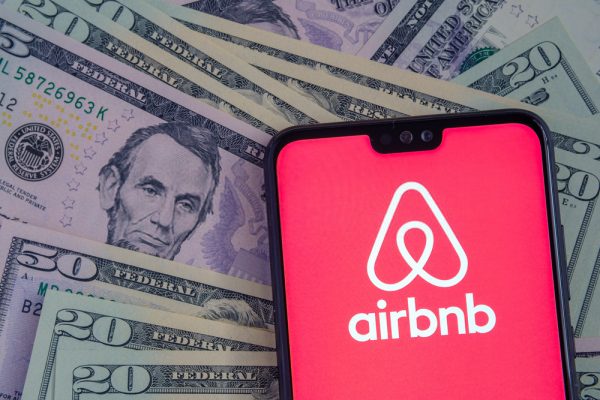
When it comes to payment plans, both Vrbo and Airbnb have their advantages so it might all come down to preference.
For Vrbo, its advantage comes in the form of flexibility. That’s because Vrbo allows hosts to set the deposit policy that’s most convenient for them. Hence, you can take all of the payments upfront or simply ask for a deposit. Moreover, you can even set the balance to be paid upon arrival or in multiple installments. As a result, hosts who need to manage cash flow more strictly might prefer Vrbo’s payment plans.
On the other hand, Airbnb’s advantage is that it takes care of the admin side for you. Airbnb asks guests to pay everything upfront. Then, Airbnb will pay the hosts later (usually after the guests have already checked in). As a result, guests usually don’t cancel their bookings on Airbnb as easily because everything is paid. However, this can be a headache because you need to go through Airbnb for cancellation and all other adjustments.
Damage Deposits
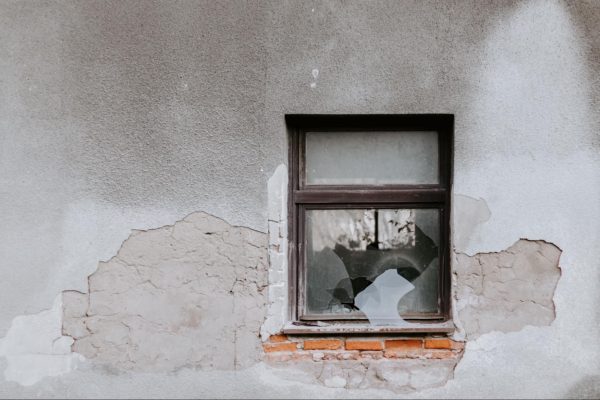
Both of these services carry less of a risk when it comes to damages. However, we can’t say the same for hosts who might carry all the burden when a customer is irresponsible. Thankfully, both Vrbo and Airbnb have some form of damage deposit management that hosts can utilize. In this next part, we’ll discuss Vrbo and Airbnb’s insurance and how you can ensure your property’s safety.
When it comes to damages, Vrbo adopts a more “hands-off” approach. It pretty much allows hosts to directly contact their guests for the deposit. Hence, hosts can decide the amount, when they’ll charge it, and when (or if) it’s refunded. Moreover, hosts are also responsible for handling claims with their guests.
On the other hand, Airbnb is a little more structured. That’s because you’ll be able to collect all the damage deposits you set on your listings. Airbnb will then manage these deposits and retain the guest’s card details or collect their payment. Afterward, hosts can claim the deposit 14 days after a guest checks out if something went wrong. However, Airbnb will also have to verify this with the guest to ensure both party’s safety.
Cancellation Policy

Now, it’s time to talk about the Vrbo vs Airbnb cancellation policy and how both services can protect their hosts. Which one is best? Thankfully, both services have some structure when it comes to cancellations.
Vrbo’s Cancellation Policy
Firstly, let’s discuss Vrbo’s five main cancellation policies: no refund, strict, firm, moderate, and relaxed. The first one is pretty self-explanatory. However, the rest of the terms are a bit more complex.
Vrbo’s Strict policy allows guests to get a full refund if they cancel up to 60 days before their reservation. This means there’s very little room to change your mind with such a listing unless you’re willing to lose money. On the other hand, the Firm policy retains that same “full refund within 60 days” mechanic but allows guests to get a 50% refund if they cancel within 30 days of their booking.
Their Moderate policy becomes looser, allowing full refunds when guests cancel up to 30 days before the reservation. Moreover, it also provides a 50% refund if a guest cancels up to 14 days beforehand. Lastly, Vrbo’s Relaxed policy allows full refunds if you cancel 14 days before the start date. It even gives a 50% refund if you cancel seven days before the reservation.
These cancellation policies make Vrbo very attractive for hosts because it keeps cancellation rates down. Moreover, it protects the host from losing money when guests are fickle and suddenly change plans. However, it’s not as attractive for guests who want something more flexible.
Airbnb’s Cancellation Policy
On the other hand, Airbnb provides only three types of cancellation policies: strict, moderate, and flexible. However, even its strictest cancellation policies are flexible when compared with Vrbo. Hence, lots of customers favor the platform when plans aren’t as concrete.
The Strict policy of Airbnb allows guests a full refund within 48 hours after booking and 14 days before check-in. Moreover, they’re allowed a 50% refund if they cancel seven to 14 days before the reservation date.
On the other hand, the Moderate policy provides a full refund when guests cancel five days before the reservation date. They’re also allowed a 50% refund minus the first night (paid in full) if they exceed five days.
Lastly, Airbnb’s famous Flexible cancellation policy provides a full refund if you cancel up to 24 hours beforehand. If a guest exceeds 24 hours, they still have to pay for the first night. However, they can get a full refund for the rest of the reservation dates.
This makes Airbnb extremely attractive for guests. Moreover, listings with a flexible policy are usually booked more often compared to other listings. However, this also means that Airbnb is much riskier for hosts.
App Usability and Interface
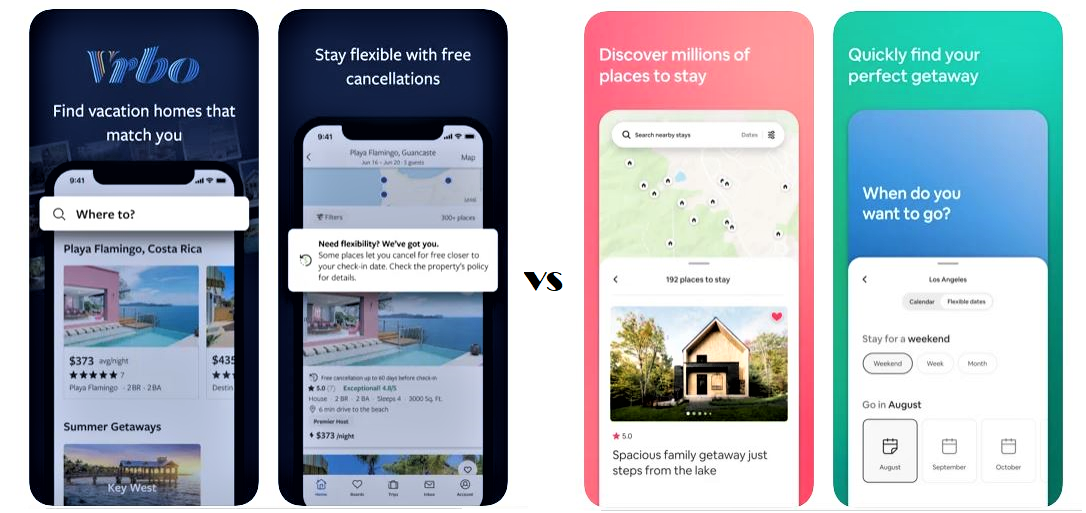
Both Vrbo and Airbnb have mobile apps, which make them both convenient for the masses. For the most part, both apps have a user-friendly interface. They both also have high ratings on the Google Play Store and App Store. However, like with most apps, both also have their quirks and kinks.
Users of the Android version of Vrbo’s app have recently reported a few bugs related to the booking. One user reported that the app declines bookings for listings that are all supposed to be available. Another user also reported that the app doesn’t load pages as quickly or easily. Despite this, the app retains its high 4.2-star rating on the Play Store.
On the other hand, Airbnb has a higher 4.6-star rating on the Play Store. Moreover, it has fewer complaints overall regarding the user interface. However, one user reported on a new update that makes the app more clunky and unclear to use.
Overall, both apps provide what users can usually access on either service’s websites. However, Airbnb seems to have a better, more usable interface compared to Vrbo.
Download the Vrbo app for Android or iOS
Download the Airbnb app for Android or iOS
Customer Service

Between Vrbo vs Airbnb, the former might have the upper hand when it comes to customer service. That’s because Vrbo can include travel protection insurance in its reservations. Hence, canceling your trip due to unforeseen circumstances can give you a higher chance for a refund.
Vrbo also comes with a “Book with Confidence Guarantee” feature that ensures customer support. With this, Vrbo users can ask questions to Vrbo’s staff whether it’s before, during, or after their vacation. Moreover, these customer support staff also assist users in finding other accommodations when their host cancels a reservation.
Unfortunately, Airbnb doesn’t come close when it comes to providing customer support. That’s because its service mostly caters to customers with emergency issues. This usually only happens when guests can’t get to their rental or if there are safety issues.
Moreover, Airbnb is stricter when it comes to acquiring evidence before guests can apply for a refund. Hence, guests need to contact their host and coordinate with them first, usually stretching the process out for longer.
Consumer Reviews

Vrbo vs Airbnb: which one is better when it comes to asking and providing consumer and host reviews? Both services have a system that allows guests and hosts to rate and write reviews. However, they differ slightly in their timeline and execution.
For Airbnb, the app encourages guests to rate their accommodations after their stay. They have this opportunity for up to 14 days after their last day — this goes for both guests and hosts. Moreover, Airbnb uses a 5-star rating system and divides the feedback into categories. For example, the guest can rate a listing’s accuracy in terms of the description, cleanliness, communication, etc.
On the other hand, Vrbo extends this review timeline to up to one year after a guest’s reservation. However, the caveat is if either the guest or host leaves a review, the other party is prompted to reciprocate. The other party has a 14-day time frame to add their review and leave their side of the story. Likewise, Vrbo also uses a 5-star rating system to rate user experience.
With that said, both services have a decent review system that provides other users more insight before booking. However, Airbnb has a bit of an advantage as its host’s responses to reviews are displayed in the review section. This allows users to view both sides of the story upfront without having to dig deeper.
Verdict: Which Is Better for Planning Your Vacation?
Between Vrbo and Airbnb, which one is the better booking platform? Well, the answer will always depend on what you’re looking for. If you’re traveling in a large group, it may be worth looking into Vrbo’s listings. That’s because their properties are specifically large estates so you’ll be sure to accommodate everyone in your group. Moreover, Vrbo is great if you want a true vacation where you can have privacy and freedom.
On the other hand, Airbnb is much better for lone travelers or those who want to travel in pairs. It’s also the better option if your trip is prone to sudden cancellations. It’s also the better choice for more adventurous people who want more flexible rental types. However, it’s not exactly the best for large groups who want a lot of privacy.
Both services have their advantages and disadvantages at this point. Regardless of which you choose, you’ll be able to find good, affordable accommodations without having to book a hotel.

